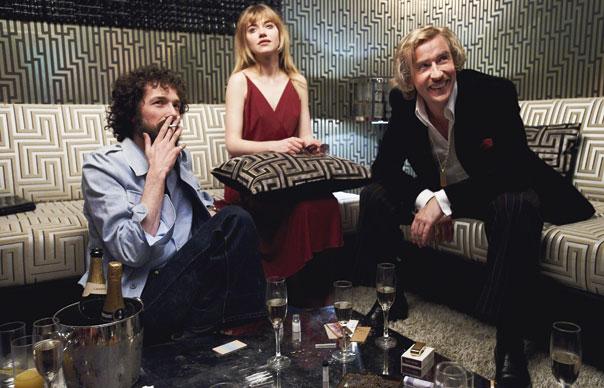A collaboration between filmmaker Michael Winterbottom and star Steve Coogan, where a lad from the north west of England makes good in unconventional circumstances, accompanied by a bunch of like-minded, but broadly eccentric characters. This is the story of Soho porn entrepreneur Paul Raymond, but it could just as easily describe the trajectory of Tony Wilson, the subject of Winterbottom and Coogan’s first collaboration, 24 Hour Party People – or even Coogan’s own back story, which stretches back to his working class origins in Liverpool. Winterbottom’s film – originally called The King Of Soho – covers the period from the late 1940s to 1992, and broadly follows Raymond’s colourful rise from mind-reading act on Clacton pier to one of the richest men in Britain, with an estimated fortune of £650 million made from real estate and ‘adult publishing’. As per previous Winterbottom/Coogan collaborations, the vibe here is loose and episodic. The fourth wall is broken (“My name is Paul Raymond, welcome to my world of erotica,” Coogan addresses the audience at the film’s start) while Winterbottom plays around with film stock and editing techniques to move the story along. Matt Greenhalgh’s screenplay streamlines Raymond’s story – it skates over assorted lawsuits and extortion attempts – and instead draws out thematic threads from his life, in particular his relationship with women. On one hand, Raymond is a man who made a significant part of his fortune exploiting women, while on the other he adored strong, independent women. Chief among these are his first wife Jean (Anna Friel), glamour model girlfriend Fiona Richmond (Tamsin Egerton) and his free-spirited daughter Debbie (Imogen Poots). Raymond’s wider entourage include Chris Addison – sporting a curly black wig and matching beard – and James Lance as his Men Only editor and lawyer, respectively. Winterbottom brilliantly handles the pace of the gang’s shaky ascent as they attempt to “rewrite the cultural history of the nation”, building up the cocaine use, orgies and lifestyle extravagances with the same forceful persuasion Scorsese brought to GoodFellas. Soon, Raymond is living in the prestigious Arlington House block by the Ritz, in a penthouse apartment with a retractable ceiling. “Ringo helped me design it,” he says proudly, in a rare Partridge-esque moment. “I’m very good friends with The Beatles. Apart from Yoko.” But behind the unconventional, freewheeling exterior, Coogan depicts Raymond as a determined, ruthless businessman. “Normal life is for normal people,” he says at one point, but despite the great wealth he accumulates, the film’s opening and closing images – of the solitary, broken Raymond watching footage of his beloved Debbie on a videotape – ask us to consider whether it’s all worth it. Michael Bonner Special offer! For one week only, subscribe to Uncut from only £15.35 and save up to 50%! Don’t miss out on this great offer as it won’t be around for long. Please note, the 50% discount is available to UK Direct Debit subscribers only.
A collaboration between filmmaker Michael Winterbottom and star Steve Coogan, where a lad from the north west of England makes good in unconventional circumstances, accompanied by a bunch of like-minded, but broadly eccentric characters. This is the story of Soho porn entrepreneur Paul Raymond, but it could just as easily describe the trajectory of Tony Wilson, the subject of Winterbottom and Coogan’s first collaboration, 24 Hour Party People – or even Coogan’s own back story, which stretches back to his working class origins in Liverpool.
Winterbottom’s film – originally called The King Of Soho – covers the period from the late 1940s to 1992, and broadly follows Raymond’s colourful rise from mind-reading act on Clacton pier to one of the richest men in Britain, with an estimated fortune of £650 million made from real estate and ‘adult publishing’. As per previous Winterbottom/Coogan collaborations, the vibe here is loose and episodic. The fourth wall is broken (“My name is Paul Raymond, welcome to my world of erotica,” Coogan addresses the audience at the film’s start) while Winterbottom plays around with film stock and editing techniques to move the story along. Matt Greenhalgh’s screenplay streamlines Raymond’s story – it skates over assorted lawsuits and extortion attempts – and instead draws out thematic threads from his life, in particular his relationship with women.
On one hand, Raymond is a man who made a significant part of his fortune exploiting women, while on the other he adored strong, independent women. Chief among these are his first wife Jean (Anna Friel), glamour model girlfriend Fiona Richmond (Tamsin Egerton) and his free-spirited daughter Debbie (Imogen Poots). Raymond’s wider entourage include Chris Addison – sporting a curly black wig and matching beard – and James Lance as his Men Only editor and lawyer, respectively.
Winterbottom brilliantly handles the pace of the gang’s shaky ascent as they attempt to “rewrite the cultural history of the nation”, building up the cocaine use, orgies and lifestyle extravagances with the same forceful persuasion Scorsese brought to GoodFellas. Soon, Raymond is living in the prestigious Arlington House block by the Ritz, in a penthouse apartment with a retractable ceiling. “Ringo helped me design it,” he says proudly, in a rare Partridge-esque moment. “I’m very good friends with The Beatles. Apart from Yoko.” But behind the unconventional, freewheeling exterior, Coogan depicts Raymond as a determined, ruthless businessman. “Normal life is for normal people,” he says at one point, but despite the great wealth he accumulates, the film’s opening and closing images – of the solitary, broken Raymond watching footage of his beloved Debbie on a videotape – ask us to consider whether it’s all worth it.
Michael Bonner
Special offer!
For one week only, subscribe to Uncut from only £15.35 and save up to 50%! Don’t miss out on this great offer as it won’t be around for long. Please note, the 50% discount is available to UK Direct Debit subscribers only.



